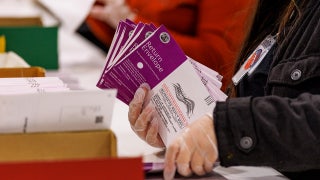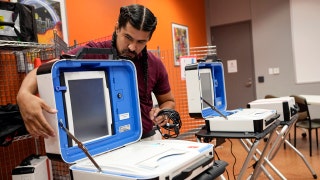New Jersey voters weigh in on upcoming Election Day
‘Fox & Friends Weekend’ co-hosts Pete Hegseth and Will Cain talk to New Jersey voters.
The House race for New Jersey's second congressional district has gained national attention as party-switcher Rep. Jeff Van Drew is in a tight race with Democratic challenger Amy Kennedy.
According to the latest polling from RealClearPolitics, Kennedy holds a slim lead over her incumbent opponent of 48-44.5, or an average of about 3.5 percentage points.
Here's what you should know about Amy Kennedy before stepping into a voting booth:
NEW JERSEY'S GOV. MURPHY WON'T RULE OUT ANOTHER CORONAVIRUS LOCKDOWN AS CASES SPIKE
1. She is a former public school teacher
Kennedy has over a decade of experience in education from her time as a middle school history teacher at Northfield Community Schools. She holds a Bachelor of Science in Elementary Education from Pennsylvania State University and a Master of Science in Environmental Education from Nova Southeastern University.
While never serving in political office herself, she is a fourth generation South Jerseyan who comes from a political family, with her father, Jerry Savell, serving as an Atlantic County freeholder and councilman in Absecon and Pleasantville, New Jersey.
2. She is a member of the Kennedy political dynasty
Amy Kennedy is married to former eight-term Congressman Patrick Kennedy (D-RI), son of the late Senator Edward Kennedy. The couple wed in July 2011 and live in Brigantine with their five children, including one from her previous marriage with Mark Petitgout, a former Penn State Nittany Lions football player and brother of NFL offensive tackle Luke Pettigout.
Town and Country magazine notes that if Amy were to lose, it would be the first time in 60 years that a member of the Kennedy family would not be in Congress, following current House member Joseph Kennedy III's loss to Senate primary challenger Ed Markey earlier this year.
A DEMOCRAT-TURNED-REPUBLICAN AND A KENNEDY ARE GOING HEAD-TO-HEAD IN A NEW HOUSE RACE
3. She is a mental health advocate
Kennedy serves as director of the Kennedy Forum, a behavioral nonprofit founded by her husband, where she has made multiple public appearances speaking about addiction and mental health initiatives.
In addition, she serves on the boards of Mental Health America, a leading national advocacy organization and Parity.org, which promotes gender parity at the highest levels of business.
She also is an advisory board member of Interaxon, a mental health technology company, Set To Go, a Jed Foundation program helping teens transition from high school to college and adulthood with special emphasis on mental wellness and emotional preparedness, and Brain Futures, a nonprofit dedicated to "improving human outcomes by assessing and advancing the practical applications of new scientific understanding of the brain."
4. She's viewed as an anti-establishment candidate
The Washington Post has referred to Kennedy as a "anti-establishment insurgent trying to ride the recent energy of grass-roots activists."
Her primary win against college professor Brigid Callahan Harrison was seen by many political experts as an upset among the Democratic party for defeating a candidate backed by New Jersey political powerbroker George Norcross III.
However, despite her more progressive status, the Democratic candidate has received big-name endorsements from former president Barack Obama and current Democratic nominee and former vice president Joe Biden. In addition, she has been backed by New Jersey Gov. Phil Murphy as well as the editorial boards of the Philadelphia Inquirer and the New Jersey Star Ledger.
One of the main focuses of Kennedy's campaign is expanding South New Jerseyans' access to mental health services. According to her website, one of her goals includes holding Big Pharma and insurers accountable for their role in the opioid epidemic. She also would seek to expand access to medication-assisted treatment and require community health centers to receive federal funding.
In addition, she would seek to expand mental health screenings and care in schools, colleges and universities, at veterans' health clinics and throughout the justice system. She would also plan to provide incarcerated people increasde access to long-term addiction treatment and mental care options, and would seek to expunge nonviolent drug convictions from criminal records.
Other areas she's focused on include maintaining and improving Obamacare, universal background checks for gun owners, the decriminalization of marijuana, continuing flood insurance and tackling climate change.
In terms of the economy, she would look to expand the Earned Income Tax Credit and Child Tax Credit, raise the federal minimum wage, and update labor laws to restore the right to overtime work for overtime pay.
She also would look to make investments in infrastructure, small business' access to capital, and to create unemployment insurance for families struggling during the coronavirus pandemic, and would seek strong enforcement measures to make sure COVID-19 relief funding is given to Main Street rather than Wall Street.
Her opponent, Jeff Van Drew, has capitalized on a comment in which she said "there's a lot of merit to what we’re hearing around the country when we talk about how we should be reallocating funds to make healthy communities," accusing her of supporting the Defund the Police movement.
Kennedy, however, has pushed back against the claim, saying at a debate last month that "we need to have [police] that are better trained, that are addressing bias.”
When we are talking about how we move together as a country and mitigate the violence that we’re seeing in this nation right now," Kennedy added. "That we should be talking about solutions to that by bringing both parties to the table, making sure law enforcement has a voice at the table as well as community members.”
CLICK HERE FOR THE FOX NEWS APP
5. She's outraised and outspent Van Drew
According to the Federal Elections Commission, Kennedy has outraised and outspent her opponent, Rep. Jeff Van Drew.
Figures from the agency as of Oct. 14 note she's raised $4,246,027.08 and has spent $4,085926.21. The FEC estimates that as of Oct. 14, she had $102,831.33 in cash on hand. In comparison, figures from the agency as of Oct. 14 show Van Drew has raised $3,752,138.41 and has spent $3,004,498.03. The FEC estimates that as of Oct. 14, he had $742,777.68 in cash on hand.
Kennedy is hoping the Van Drew's party switch will be enough to help garner enough support to secure her incumbent opponent's seat.
A Monmouth University Poll last month found nearly half of voters in the district are bothered by Van Drew being elected as a Democrat but now running for reelection as a Republican, with 35 percent saying it bothers them a lot and 12 percent a little, while 51 percent say it does not bother them.
Nearly 9-in-10 Democrats (87%) and half of independents (46%) are bothered by the incumbent’s change of party affiliation, compared with 15% of Republicans who feel that way. About 12 percent of Drew’s constituents say they were not aware of his party change.
However, a recent Stockton University poll of 676 likely voters reveals the race will likely be much closer, with Kennedy leading Van Drew by just 1 percentage point, 46 percent to 45 percent — well within the poll’s margin of error of plus or minus 3.7 percentage points.
The race between Van Drew and Kennedy is currently ranked as a toss up by Cook Political Report.














































